#character: albert nolan
Explore tagged Tumblr posts
Text
I got my friends to guess the name of CoD characters and I thought I taught them well.
Friend 1 - Kate Laswell = Karen Duh Alejandro Vargas = Slogan Rodolfo "Rudy" Parra = Billu Johnathan "John" Price😍= Mr Birling (only real ones will know the reference.) Simon "Ghost" Riley = Paddy John "Soap" MacTavish = Soap (So proud👏) Kyle "Gaz" Garrick = Michael Nikolai Belinski = NIKOLAI (they love Nikolai) Farah Karim = Weely (umm) Hadir Karim = Bilbo (ermm) Alex Keller = (quoted btw) That's just a pedophile it's like Uncle Albert or smth. (not my bbg, no.) Valeria Garza = Keira Vladmir Makarov = Grr alpha Bordy (same bro) Andrei Nolan = English roadman fucking Harold (not the aussie turned ultranationlist) Milena Romanova = Bonice Phillip Graves = Wankathon (I mean, i'd do that *lip bite*) Herschel Shepherd = Pops (real) Hassan Zyani = Andrew Tate König = Skylar Horangi = Soldier #2 Logan Walker = Lucas (so close bro) David "Hesh" Walker = Thirsty Sam💀 Elias Walker = Silver Fox Rudolph (smash) Keegan P Russ = Lucas Brother Mathew (wrong one mate and no) Thomas A Merrick = Hudson (also doesn't like bald people hense the name.) Kick = Nightrider (That's what i do😝) Riley Walker = Riley (SO PROUD👏👏) Friend 1 = 3/27 Friend 2 - Kate Laswell = Vanessa Alejandro Vargas = Gabriel Rodolfo "Rudy" Parra = Chad Johnathan "John" Price😍= Price (SOO PROUD👏) Simon "Ghost" Riley = Soap (wrong one mate) John "Soap" MacTavish = Basille Kyle "Gaz" Garrick = Riley (also wrong one) Farah Karim = Barbara (better than weely.) Hadir Karim = Virgin (HELP) Alex Keller = Prince Andrew (I do not except this Alex Slander, chat.) Valeria Garza = Lucinda (giving) Andrei Nolan = Baldie (i mean, real) Phillip Graves = Jon (no H, real) Herschel Shepherd = Professor X (love it) Hassan Zyani = Ryan Reynolds (don't see it) König = Wilbur Horangi = Invisible (it's the outfit chat) Logan Walker =Ninja (suurree) David "Hesh" Walker = Artificial (ermmm) Elias Walker = Whitie (true) Keegan P Russ = Wolfcut (defo) Thomas A Merrick = finger me (SOOO REAALLL) Kick = Jack (close enough) Riley Walker = BARK BARK WOOF WOOF (oui) They missed out Nikolai, Makarov and Milena (idk why) Friend 2 = 1/23
#cod#cod mw2#cod modern warfare#cod mw3#soap mactavish#simon ghost riley#john price#kyle gaz garrick#kate laswell#alejandro vargas#rodolfo parra#valeria garza#farah karim#hadir karim#alex keller#phillip graves#general shepherd#nikolai belinski#konig cod#horangi#cod ghosts#call of duty ghosts#logan walker#keegan p russ#elias walker#david hesh walker#thomas merrick#kick cod#riley cod#guessing game
40 notes
·
View notes
Text
Andrei Nolan NSFW Alphabet
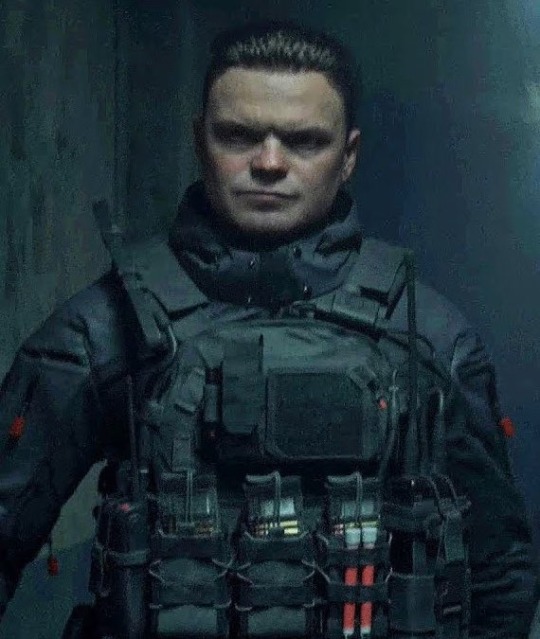
A = Aftercare (what they’re like after sex)
Andrei is a sucker for cuddling. Would lay on his back with your head on his chest calming down from the intense moment.
B = Body part (their favorite body part of theirs and also their partner’s)
He likes his arms, the muscles he has built up over the years of serving in the military makes it easier to manhandle you into positions that he likes.
He loves your thighs; squeezing, pinching, gripping all of it! Would deem it an honor to be suffocated by them.
C = Cum (anything to do with cum, basically)
Deep in you for sure! If you’re not into that then he’ll pull out and cum on your entrance.
D = Dirty secret (pretty self explanatory, a dirty secret of theirs)
He fantasizes about a threesome with the two of you and Makarov. The thought of you between the two of them makes him feral.
E = Experience (how experienced are they? do they know what they’re doing?)
Pretty average experience, knows a good deal about the body to give you more pleasure.
F = Favorite position (this goes without saying)
Mating press. Being able to manhandle you into the position while guaranteeing he can cum deep into you while getting a good view of your face.
G = Goofy (are they more serious in the moment? are they humorous? etc.)
Mid-serious, he doesn’t have much time due to being second in command so he cherishes the time he has with you. Will still laugh if something humorous happens.
H = Hair (how well groomed are they? does the carpet match the drapes? etc.)
Keeps it trimmed, not overly bushy but not clean-shaven.
I = Intimacy (how are they during the moment? the romantic aspect)
He looks at you like you hung the stars. Worships you and your body like it’s his last day on earth.
J = Jack off (masturbation headcanon)
Not often due to his schedule, will send videos of himself doing it though to let you know that you’re on his mind.
K = Kink (one or more of their kinks)
Power-play, rigging, praise with hidden degradation, choking, brat taming, edging, and overstimulation.
L = Location (favorite places to do the do)
Bedroom, but won’t complain if you end up in a closet or bathroom stall.
M = Motivation (what turns them on, gets them going)
Seeing you in tight clothes.His main motivation is seeing you in his shirt and a pair of tight booty shorts.
N = No (something they wouldn’t do, turn offs)
Anything that could endanger your life if not well versed. Gunplay, knifeplay, choke collars. Does not like you not being able to communicate with him.
O = Oral (preference in giving or receiving, skill, etc.)
Is a mix of both, loves seeing you on your knees infront of him. But enamored by your taste, loves being crushed by your thighs when he does.
P = Pace (are they fast and rough? slow and sensual? etc.)
Likes to start slow, then builds it up until the bed starts to roughly shake like your thighs would be afterwards.
Q = Quickie (their opinions on quickies, how often, etc.)
Sees them as a godsend. With how busy he is he loves releasing stress with his beautiful partner.
R = Risk (are they game to experiment? do they take risks? etc.)
Only after research is done, does not like to try something new without seeing the risks and benefits.
S = Stamina (how many rounds can they go for? how long do they last?)
About three rounds, this Aussie man has the endurance to make them last a while though.
T = Toys (do they own toys? do they use them? on a partner or themselves?)
Sees toys as a plus, loves seeing how much pleasure he can get from you with a vibrator.
U = Unfair (how much they like to tease)
Is a fair teaser, knows that you will have to wait for him to have a chance to get away long enough.
V = Volume (how loud they are, what sounds they make, etc.)
Grunts and groans, talks you through it, occasionally moans if he is overstimulated. Has whimpered before when you take control and tease him for a while.
W = Wild card (a random headcanon for the character)
Used to have a Prince Albert piercing, removed it when he enlisted though for safety reasons.
X = X-ray (let’s see what’s going on under those clothes)
Muscular body with a short, thick cock. Average length but nicely thick to stretch you.
Y = Yearning (how high is their sex drive?)
Pretty normal, gets pent up if he doesn’t release about three times a week.
Z = Zzz (how quickly they fall asleep afterwards
When he is done comforting you he dozes off after about ten minutes.
258 notes
·
View notes
Text
speculations
Came back online despite being very dramatic about going on a hiatus just to say!!! that these are all Ashwini Moons and no one can convince me otherwise. I DO NOT CARE.
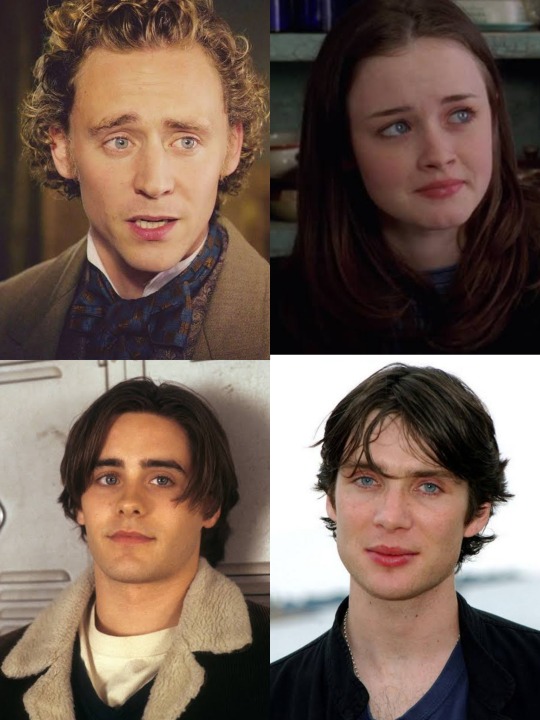
Also one is a confirmed Ashwini Moon, guess which one.
(yes jared leto who was tom hiddleston's look alike for some years. yes his birthtime accuracy is rated excellent. look at the shape of his eyes, and tom's, and alexis bledel's. they have the same eye shape. even as cilian's. the eyes are childlike and expressive. these are sidereal aries moons. ashwini faces.)
And just watched Oppenheimer and Cilian Murphy is playing Ashwini Sun J Robert Oppenheimer.
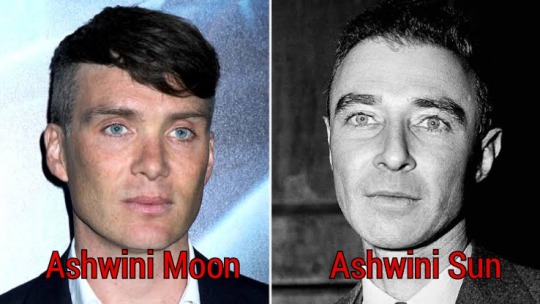
The shape of the eyebrows, despite one being thicker than the other, are literally the same. And the eyes! Ashwini!!!
Oppenheimer's wife in the film is played by Shatabhisha Sun Emily Blunt and the two go on horse ridings which is also an interesting detail as Ashwini & Shatabhisha are horse yonis (which also means they're extremely compatible). Cilian Murphy's eyes look Ashwini as well as J Robert Oppenheimer's, they're big and sensitive, sometimes they're scary and sometimes they look childlike. And yes Tom Hiddleston to me is an Ashwini Moon, his birth time is unconfirmed and in the date he was born he's either Revati or Ashwini Moon. I don't know why the other possibility isn't challenged. He was in a historical piece alongside Ashwini Moon Benedict Cumberbatch called WAR HORSE.
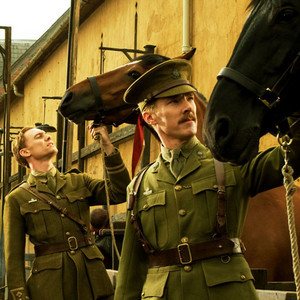
Film summary: "Albert and his horse Joey are inseparable. However, when Joey is sold off to the British cavalry, Albert follows him in the hope of reuniting with his best friend."
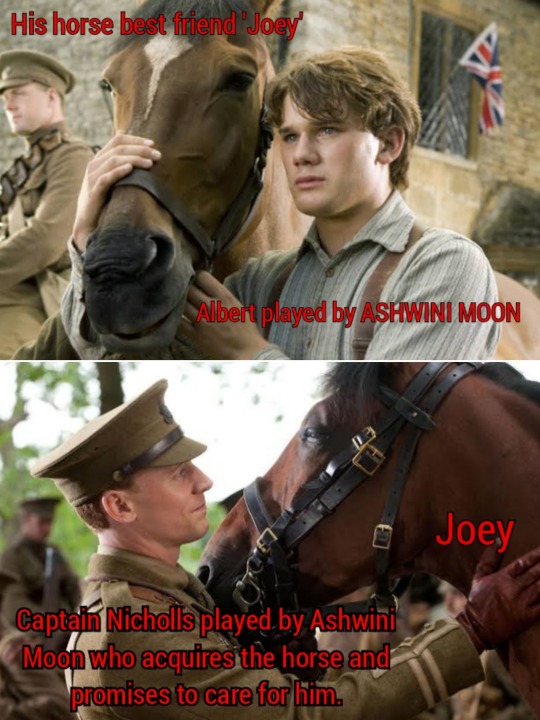
Tom Hiddleston played Captain Nicholls as seen above.
The horse is not just the yoni of Ashwini, it is the symbol of this nakshatra, it is how the DEITIES of this nakshatra look like. (Ashwini Moon Tom Shelby (a character who's actively involved in a gambling ring that involves horse racing bets) on his black horse which he named Grace's Secret).
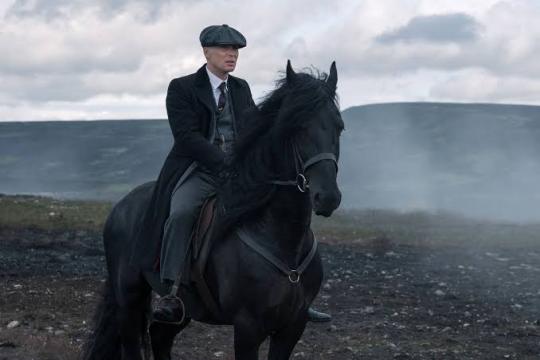
So horse symbolism runs more deep in this nakshatra. So that's an important detail.
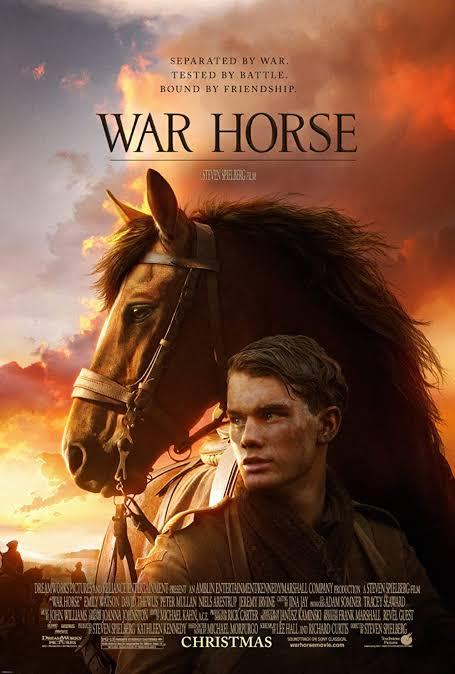
The very war themes of the film and the two getting through that to reunite in the end is very Martian. Mars represents war, Aries descendant is Libra/7H which is friendships. Which interesting enough, the film was directed by Libra Moon Steven Spielberg.
Albert in the film is played by Ashwini Moon Jeremy Irvine.
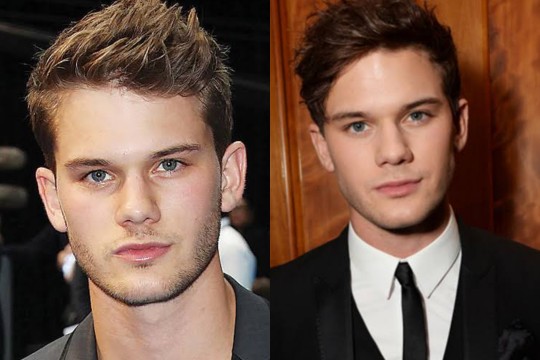
As you can see, he has the Ashwini eyes. Compare his eye shape to the first four Ashwini Moons I started mentioning. And it's the same shape. It seems that Ashwinis have either round/round-ish almond eyes or just simple almond eyes. His eyes appear very sensitive, present and childlike even. And he has a youthful appearance. Which is typical Ashwini.
These are Ashwini Moon faces idc idc idc!!!
(ashwini is so underrepresented i feel like a lot of them are lumped in with revatis and that kinda irritates me ngl)
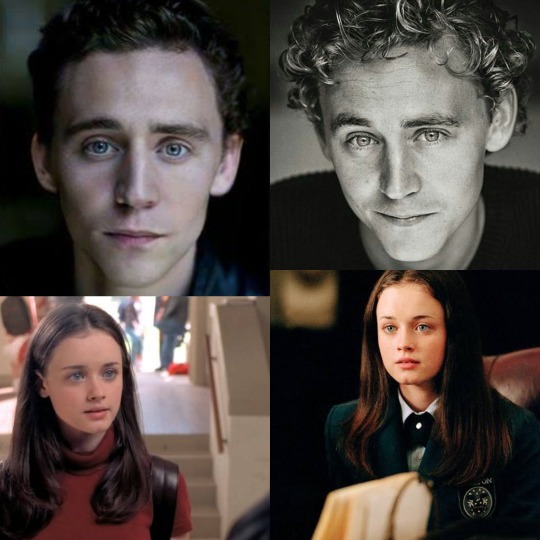
Also, Christopher Nolan really likes his Ashwini Moons. Fun fact; Ashwini Moon native Cilian Murphy lost his role of Batman to another Ashwini Moon native Christian Bale. But continued to work with Christopher Nolan. Funny cause I see that Ardras really love Ashwinis. Nolan is an Ardra Moon. Him and Cilian have done three projects together now. Him and Christian Bale have done Batman films and also The Prestige (so 4).
[Chad Michael Murray is Mrigashira Moon so scratch the second pairing out]
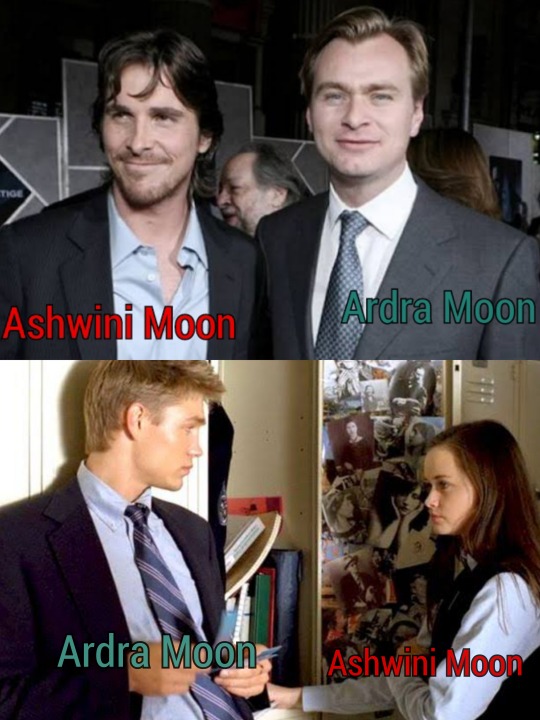
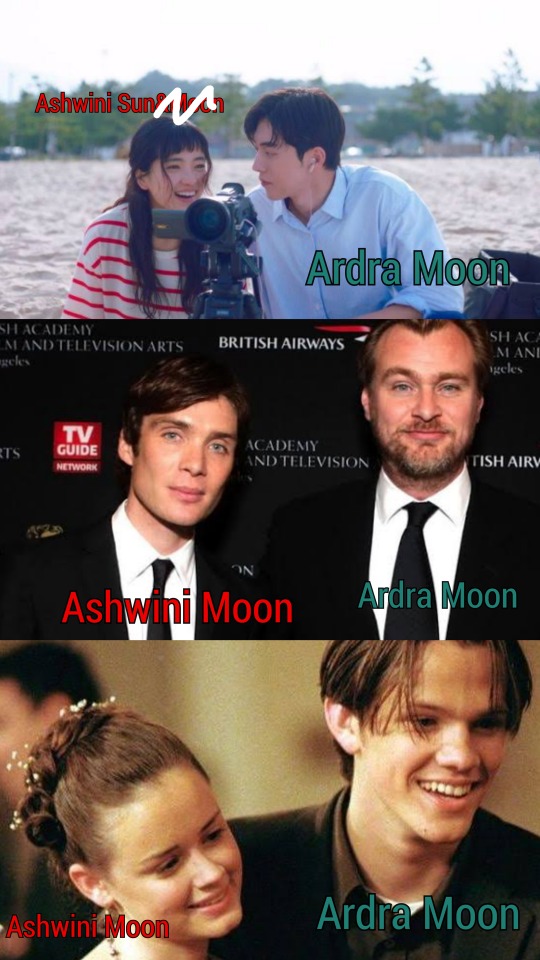
#Ashwini#ashwini nakshatra#vedic astrology#vedic observations#sidereal aries#sidereal astrology#Aries#astro observations#astrology#vedic astro notes#nakshatra observations#sidereal observations#sidereal observation#vedic notes#vedic astro observations#astro notes#astro observation#1st house#mars#ketu#ketu nakshatras#ardra#ardra nakshatra#Gemini#Mercury#3rd house#nakshatra series
246 notes
·
View notes
Text
Best Character Named X Poll
I'm doing a series of "Best Character Named X" polls where all the characters have the same first name but are from completely different media, feel free to send in name/charcacter suggestions, I'm posting one poll a day. New polls scheduled for 1:30PM BST everyday.
If your favourite character is not included in the poll very sorry i have either never heard of them or actively chose not to include them as theres only 6 characters per poll. Characters will only count of that is their first name, surnames do not count. Official characters in canon only, please do not submit OCs.
Round 517: Liam
Round 518: Roxy
Round 519: Mike
Round 520: Mira
Round 521: Ragnar
Round 522: Melody
Round 523: Roman
Past Polls
Poll Ideas under the cut
Names that I have a complete list for*
Katya, Miriam, Bianca, Aurora, Ramona, Kala, Madeline, Marian, Lena, Cora, Irene, Hilda, Marissa, Lenore, Winona, Una, Marnie, Mirabel, Olympia, Rue, Leslie, Celeste, Pauline, Darcy, Ella, Yukari, Tanya, Briar, Akira, Marlene, Letitia, Koichi, Carina, Yuki, Dee, Sasha, Zain, Edith, Candy, Yumi, Sakura, Suki, Amelia, Sonny, Brianna, Norma
Names I have an incomplete list for (welcome to send character suggestions)
Yasmin, Chase, Rudolf, Adeline, Jem, Jude, Bellamy, Nemo, Addison, Adelaide, Candace, Abraham, Destiny, Hero, Drew, Wallace, Jean (feminine), Cheryl, Shane, Tegan, Matthias, Ellis, Josie, Bailey, Eden, Giselle, Keith, Wilfred, Blaine, Pam, Sabine, Kalina, Mindy, Monet, Zara, Elias, Glen, Farah, Faith, Enid, Ross, Antoinette, Elodie, Mallory, Kay, Renee, Willow, Albert, Howard, Clem, Howell, Rowan, José, Christian, Ravi, Dev, Valerie, Tristan, Jolene, Carrie, Casper, Septimus, Rosalind, Rosamund, Rosie, Rosa, Gerald, Geraldine, Gerard, Ariel, Ariadne, Anya, Ida, Rocky, Mal, Solomon, Sol, Vera, Vincent, Nolan, Sage, Jojo, Calliope, Roxanne, Silver, Noel, Stacy, Lloyd, Alba, Virginia, Eva, Amos, Petra, Marla, Gretchen, Rhydian, Russ, Tate, Tatum, Morris, Ambrose, Grant, Graham, Ivan, Paris, Doris, Rain, Sora, Helga, Garth, Constantine, Courtney, Jamal, Niall, Cecil, Cecilia, Cat, Katherine, Ophelia, Laurie, Lori, Bernadette, Lauren, Angela, Angelina, Angelica, Janine, Austin, Niles, Catriona, Katarina, Octavia, Octavius, Octavian, Eliza, Elisa, Buffy, Bruno, Cyril, November, Winter, Colette, Mercy, Gertrude, Juri, Anton, Edgar, Franklin, Kai, Nash, Blitz, Varrick, Esteban, Damon, Wilbur, Alexis, Siobhan, Killian, Iris, Kaoru, Buttercup, Nero, Dimitri, Sawyer, Tamsin, Aya, Coco, Lucien, Ursula
Feel free to send more suggestions
*subject to change, you can still submit a character if there is no strikethrough if you think theres a character that its an absolute crime i dont add. Please don't suggest anything for the names with a strikethrough as they are polls that are already in my queue waiting to be published.
39 notes
·
View notes
Text
'Christopher Nolan has a knack for wrangling impressive ensemble casts for his films, but he really outdid himself with his 3-hour historical epic Oppenheimer. Even if the World War II biopic didn’t include the frequent Nolan collaborator Michael Caine, the stacked ensemble is filled with a terrific ensemble of veteran Hollywood stars, Academy Award-winning performers, underrated character actors, relative unknowns, and a few former box office titans that have seemingly disappeared over the last decade or so. It wasn’t that long ago that Josh Hartnett was the marquee lead of films like Lucky Number Slevin and Black Hawk Down, but his star power has seemingly evaporated, as some actors can only maintain the same level of success for so long. However, Hartnett has always been a more interesting and complicated actor than the roles that he was given at the beginning of his career. Hartnett isn’t just in the middle of a major comeback; he basically steals Oppenheimer with one of the most nuanced supporting performances.
Why Is 'Oppenheimer's Ernest Lawrence So Important?
Oppenheimer is told in non-chronological order, in what has become a hallmark of nearly all of Nolan’s films. While Hartnett doesn’t play a significant role in the black-and-white sections that show the confirmation hearings for Lewis Strauss (Robert Downey Jr.), he is instrumental within the main storyline focused on J. Robert Oppenheimer’s (Cillian Murphy) studies at the University of California in Berkeley, where he first conceived of much of the technology that ended up becoming critical within the Manhattan Project. The sequences in Berkeley aren’t just where Oppenheimer unlocks part of his genius, but also where he falls in love with his second wife Kitty (Emily Blunt), and makes a community of friends for the first time. It is during this period that he works hand-in-hand with Hartnett’s depiction of Ernest Lawrence; having an outsider’s perspective on Oppenheimer’s work was necessary for this sequence to function.
Ernest Lawrence was an incredibly influential figure in Oppenheimer’s life. While he’s not someone that Oppenheimer often looks up to and idolizes like Neils Bohr (Kenneth Branagh) or Albert Einstein (Tom Conti), Lawrence represents the sort of man that Oppenheimer could never really become. Hartnett depicts Lawrence as a man of great importance, intelligence, and class that also has a relatively normal social life and shows an ability to adjust to the stresses within his life. Lawrence encourages Oppenheimer to find a balance within his work, but it becomes obvious that it’s not possible for someone with his capacity for genius. It creates an odd tension between them; Lawrence feels both resentful and sympathetic for his friend. Oppenheimer’s inability to simply “turn off” his brain and focus on something other than his work may end up making him more historically important than Lawrence, but it negates any sense of accomplishment or happiness he may feel.
Josh Hartnett does some really outstanding subtle work with his performance, as there’s an interesting dichotomy to Lawrence’s feelings about Oppenheimer. He’s not resentful, as he and Oppenheimer are able to get along and share much in common due to their shared experience in nuclear research. Lawrence is someone who can communicate with Oppenheimer on an intellectual level about the groundbreaking studies that are being done, but he’s not capable of reaching the same next-level conclusions. Lawrence is well-educated and knows what he’s talking about, but also acknowledges that it’s not his name that the world will remember. It was almost a bit of reflective acting on Hartnett’s part as if he was acknowledging that he was no longer the same star who had led Pearl Harbor to its box-office success two decades prior.
Ernest Lawrence Is Important to the Politics of 'Oppenheimer'
Christopher Nolan isn’t necessarily known as a “political filmmaker,” but while his films aren’t necessarily as overt as the work of directors like Oliver Stone or Spike Lee, there are strong anti-war, anti-escalation themes in The Dark Knight, Dunkirk, and Tenet. Oppenheimer is definitely Nolan’s most overtly political work to date, and Lawrence is instrumental in unpacking the film’s complex understanding (and criticism) of the decisions that Oppenheimer made on behalf of his country during his lifetime. At first, Oppenheimer’s relationship with Jean Tatlock (Florence Pugh) is nothing more than a passionate romantic affair, but it's Lawrence who explains the danger that being involved with the socialist political movement at the time that they are in. Lawrence has his personal feelings about the rising Communist movement, but he worries that Oppenheimer’s mind could be distracted when he’s working on studies that could literally change the way that mankind observes the world.
The political differences between Lawrence and Oppenheimer are fascinating, and Hartnett does a great job of showing Lawrence’s conviction in his belief and handling the dense political dialogue. It’s fascinating that Lawrence’s political beliefs aren’t delved into that deeply other than his expressed desire to keep all discussions about the socialist movement out of the classroom. Lawrence tells Oppenheimer that he considered himself a patriot, but he also wants the University to be an institute of science, and not a hangout spot for a potentially dangerous movement to begin. He and Oppenheimer begin to grow further apart as a result of this, but they still share a mutual understanding of which events transcend their own personal beliefs. Both men react with the same surprise and fear when news of Adolf Hitler’s invasion of Poland breaks.
Josh Hartnett does a great job of showing Lawrence’s empathy for Oppenheimer. While he understands that a traditional celebration isn’t necessarily something that Oppenheimer would enjoy, there’s a friendliness between the two men that continues after General Leslie Groves (Matt Damon) whisks him away to work on the Manhattan Project. Lawrence refuses to report incriminating evidence on Oppenheimer during the government’s investigation, and the two are able to shake hands at the end of the film. That’s more than Oppenheimer can say about Edward Teller (Benny Safdie), whose pro-nuclear beliefs created too much of a divide between them.
Josh Hartnett is in the midst of a much-needed comeback, and it’s great to see that Oppenheimer gave him such a nuanced role to execute. While it may have taken a while for him to finally get the chance to work with Nolan, his performance is one that is essential to show what made Oppenheimer tick on both an intellectual and personal level.'
#Josh Hartnett#Ernest Lawrence#Christopher Nolan#Oppenheimer#Leslie Groves#Matt Damon#Edward Teller#Benny Safdie#Lucky Number Slevin#Black Hawk Down#Pearl Harbor#Michael Caine#Lewis Strauss#Robert Downey Jr.#Kitty#Emily Blunt#Neils Bohr#Kenneth Branagh#Tom Conti#Albert Einstein#Florence Pugh#Jean Tatlock#The Dark Knight#Dunkirk#Tenet
57 notes
·
View notes
Text
Oppenheimer and the Chain Reaction of Violence
My take on the Oppenheimer issue regarding the omission of the Japan bombings (even though no one asked):
For those who don’t know, the movie does not include an actual visual of the bombings in Japan, to the surprise and even disappointment of some.
On the one hand, I get the critique. It’s a huge tragedy in history and a key element of the story. Maybe some people were expecting more action from Nolan. But on the other hand, the story is not about the bombings specifically. It is about Oppenheimer and his legacy.
Albert, when I came to you with those calculations, we thought we might start a chain reaction that would destroy the world.
I remember it well. What of it?
I believe we did.
The final scene of Oppenheimer, a conversation between Einstein and Oppenheimer
At the end of the movie, we finally find out what was said during the conversation between Oppenheimer and Einstein. It was a huge question mark throughout the movie because of Strauss’ schemes, but it turned out the two scientists were discussing their biggest fear—their scientific research leading to evil. Multiple characters mention the “chain reaction” and often it was in the context of chemicals and what their reaction to each other would be. But in the end, the chain reaction was something bigger—the continuation of scientific research and it leading to nuclear war.
The movie is not about the bombings in Japan. Yes, it is a huge “plot point” and the movie does build up to it, but it is just one link in that chain. Oppenheimer feels incredibly guilty for having created the atomic bomb and wasn’t at all convinced for the government to use his creation against innocent civilians. His guilt is what is most important here because it is the result of that chain reaction.
This isn’t a historical movie in the sense that we are simply given a life story of Oppenheimer. This is a historical movie that reminds us history is still influencing the present. Scientists and governments are currently working side by side to create even bigger weapons of mass destruction and it is a heavy realization that the world might one day be actually set on fire because of them. We don’t know where this current ‘Los Alamos’ is, we don’t know how big the new weapons are, but we do know they don’t lead to anything good. This is the chain reaction.
Oppenheimer was a theorist. That alone should tell you that actually creating the bomb was insane to him. He wanted to rely on theory to prove that it was possible to build one, but people around him pressed him into actually creating it and, most importantly, testing it. The Trinity test scene is prove of how horrified Oppenheimer was by his own creation. The visuals are chilling. In that scene, Oppenheimer grasped the true scale of the destruction the atomic bomb can cause. It sealed the link to that chain, and the reaction was the bombings in Hiroshima and Nagasaki.
Aside from story’s message and the relevance of showing the bombings, there is also a technical argument against including the bombings. The story is mostly told from Oppenheimer’s perspective, he is almost in every scene. But he wasn’t there when the bombings happened, so it wouldn’t have made much sense to show them. Oppenheimer asked Groves to inform him about when the bombings would happen exactly, but he heard about it like the rest of the world—through Truman’s radio announcement. Oppenheimer was incredibly anxious about the bombings, as can be seen in the scene where he is waiting by the phone the day before it happened. His guilt was eating him up from the inside while everyone celebrated either a military victory or a scientific break. Oppenheimer only saw the destruction of the world and the deaths of innocents. With his research he sealed the fates of millions of people. Because that is the chain reaction—the accumulation of historical events.
#oppenheimer#oppenheimer spoilers#christopher nolan#cillian murphy#emily blunt#j robert oppenheimer#matt damon#robert downey jr#florence pugh
43 notes
·
View notes
Text
PINNED POST AND INTRODUCTORY
A long one, but I'm sure you can make it
-_-
Table of Contents
-Introduction
-Tags and Meanings
-Discord Server
-Art Rules
-_-
Introduction
Hello, I'm unagidevi but please refer to me as Dev, Devi or Devion. People usually use Dev or Devi, but any of those three work. I have High-Functioning Autism, and ADHD. I was diagnosed when I was younger by a proper doctor. I like doing art, and writing. I also really love fantasy type stories or art, that is one of my favorites.
Some Fandoms I'm in:
Isaac Beamer Versus the Supernatural (IBVS)
Warrior Cats
Gacha by Luni/Lunime
The Umbrella Academy
Undertale / Dreamswap
My posts usually consist of Undertale, IBVS and Dreamswap. There isn't much of the others on here. I am writing two stories right now, a fantasy AU that follows two princess and a Dreamswap AU thats called Whimsical Dreamswap.

-_-
Tags and Meanings
I am sincerely sorry with how far this will probably go on, but I am going to do my best to shorten it. Blue is for OCs and Stories, Pink is Main Tags, Red is for tags relating to me, Orange is for other, Purple is for shipping. I won't be listing the Dreamsleep characters here because it takes awhile.
dreamsleep explanation - a dreamsleep tag that you can see what info there is.
dreamsleep explanation / drmslp - the fantasy AU that follows Dream and Nightmare and their travels.
asks for dev - just normal asks
devs anon asks - anon asks
dev rambles like a lunatic - rambling about anything and everything
whimsical dreamswap / whs ds - fantasy au of dreamswap
dev doodles / dev wips - doodling, sketching, etc
finchfeathers - finch and dream ship tag
magpie - blue x cross ship tag
bluetooth - blue and hacker ship tag
paintedwings / fink - finch and ink ship tag
burntstring - finch and error ship tag
tatteredwings - finch and cross ship tag
skullcandy - hacker and cross ship tag
terrorvisions - randy and dream / gay dads tag
stellars jay - blue and finch ship tag
starryskies - hacker and nightmare ship tag, reference to @starryelem
redsoul - dreamsleep ship, klaus and mal
izzy coleman / noel barker - normal ocs in a normal world
dakota feverview - dreamswap oc
rory caskey - ibvs oc
casimir dream / akli nightmare - whs ds
swindler ink / cobalt!blue - whs ds
anwar bobby / rana randy / kamaxe hacker - whs ds
arcane or arc error / azeban cross - whs ds
lorcan finch / anika whsds / whsds tank / whsds albert - whs ds
dev the simp - some tumblr ask blogs give me this name
devs pets - one or many of my tons of pets
dev ideas - dev performs an idea thats probably bad
devs ao3 - links
whs ds fanart - fanart of whs ds
drmslp fanart - fanart of dreamsleep
icterid 'starling' fink - fink shipchild, shared with @starryelem
nolan 'peridot' silva - ds errormare shipchild, shared with @starryelem
nelson 'ruby' silva - ds errormare shipchild, shared with @starryelem
hypno carmine - koriot and cross shipchild, shared with @starryelem
lavender von licht - adopted child of dreams, shared with @starryelem
[askers username] - you asked me.
-_-
Discord Server
Come join my discord server. Please follow the rules, and do not make any remarks that will be a problem. You get two warnings before a ban. If someone is giving you problems, please let me know and don't take it upon yourself.
Please remember to follow the rules, i can't stress that enough.
-_-
Art Rueles
Why do I have Art Rules? It's just a mild safety percaution.
-Do not steal my art and label it as your own.
-If you use my art for any purpose, just don't use it for nefarious purposes and at least credit me.
-Don't download and repost it, calling it 'exposure'
-Requests and Commissions are always open. Ask for Requests through my ask box!
-Please do not trace my art, thank you! Heavily referencing or just Referencing is fine.
18 notes
·
View notes
Text
𝖘𝖚𝖒𝖒𝖊𝖗𝖈𝖔𝖚𝖗𝖙𝖘𝖍𝖎𝖕 𝖙𝖚𝖒𝖇𝖑𝖗 𝖓𝖆𝖛𝖎𝖌𝖆𝖙𝖎𝖔𝖓
archive of our own | etsy
I'm Kyra and I like to write, obviously. I try to post stuff semi-regularly but please keep in mind that I also am a full time student and own a small business! But I genuinely enjoy writing and talking with you guys so please don't hesitate to reach out.
𝖈𝖚𝖗𝖗𝖊𝖓𝖙 𝖕𝖗𝖔𝖏𝖊𝖈𝖙𝖘
A HEAVY KIND OF MADNESS. [arcane: silco x reader]
After an accident at The Last Drop, you are put in Silco’s debt. Unable to pay, you strike up a deal with him- you’ll serve as his courier and deliver letters Topside until your debt is repaid. Despite everything you had been warned about while growing up in Piltover, you find yourself increasingly drawn to Silco and the danger he represents. With an arranged marriage and family expectations hanging over your head, you find freedom and temptation in your new double life and the man who runs it. But you can only lie for so long before it starts to catch up to you, and that includes the lies you tell yourself.
REVELATIONS FROM CRAWLING ON THE FLOOR [fallout new vegas: vulpes inculta x f!courier]
After an attack on the village she's staying in, a young woman named Ena disguises herself as a man to avoid being taken as a slave, only to end up forced to join the Legion. From the get-go, Vulpes is suspicious of her yet doesn't expose her for reasons he's keeping close to his chest. Secrets, spying, and sneaking around ensue.
𝖈𝖔𝖒𝖕𝖑𝖊𝖙𝖊𝖉 / 𝖔𝖓 𝖍𝖎𝖆𝖙𝖚𝖘
STAY TO BURN ONLY TO DROWN INSTEAD [batman: bruce wayne x reader, jonathan crane x reader, edward nashton x reader.]
You accept an offer to TA for Dr. Jonathan Crane's Psychology of Fear class and everything goes to shit from there. A mixture between the Nolan!verse and the Reeves!verse. The masterpost linked has links to other works in the universe as well.
KINGDOM COME UNDONE [star wars: kylo ren x reader]
You are a fighter for the Resistance, captured after a mission goes wrong. But where you expected to be interrogated for information you didn't have and subsequently killed, you instead meet your soulmate. Unfortunately. ON HIATUS
𝖈𝖍𝖆𝖗𝖆𝖈𝖙𝖊𝖗 𝖒𝖆𝖘𝖙𝖊𝖗𝖕𝖔𝖘𝖙𝖘
dr. jonathan crane (nolan!verse) bruce wayne (reeves!verse) edward nashton (reeves!verse) vulpes inculta danny johnson/ghostface amanda young/the pig albert wesker/the mastermind other characters masterpost
character list + rules REQUESTS ARE CLOSED: there are currently ten requests in my inbox! they are answered as I write them, not in order of arrival, sorry.
♡♡♡
31 notes
·
View notes
Note
haha hey what if. newsies dead poets au
AFISNDOANSOANFN IT DELETED MY FIRST ANSWER. FINE. WHATEVER. ANYWAYS.
so I’m thinking there are two ways this can go down-
(with me flying fast and loose between 92sies and livesies)-
one: the poets become newsies. essentially they’ll be “filling in” the roles each newsie brings to the film/show. neil is jack, because of course he is. he’s the charismatic leader who needs more therapy than he can pay for. his davey is obviously todd, because he’s the shy, smart kid that likes to be hidden behind his boyfriend best friend. charlie is the comedic relief of a best friend, making him race. and since knox is his best friend who’s more than half in love with him, he can be the other comedic relief of albert. we all know meeks and pitts are in love (guys, they dance together. what?), so they can take the place of kid blink and mush, respectively. do I have to include cameron? I feel like I have to include cameron. I guess he can take the spot of boots, which feels rude to boots, but I think he knows I’m sorry about it, so we’re good. keating, of course, is our father figure news reporter, and chris is sarah (WHICH MAKES GINNY HER KATH AND OH MY GOD I LOVE THAT IM SO SMART). mr. perry can be snyder, the rat, and mr. nolan is pulitzer. and stick is crutchie (no, I do not care that he’s not technically a character. he is my baby, and he can be neil’s little brother. fight me.)
I really like that one, actually.
two: the newsies become poets. same concept, other way around. now, the most obvious choice is to make jack and davey neil and todd again, but that’s a cop-out and I refuse. so. crutchie deserves to be todd, because they’re both so cute. davey can be neil, with jack being his charlie (does that mean davey/crutchie? I don’t know. is javid platonic in any scenario? I think not.). finch is meeks, albert is pitts. race is now our knox, pining HARD after- wait for it- our chet danburry character, mr. spot conlon, who is engaged (against his will) to katherine pulitzer, the wealthy daughter of the headmaster, joseph pulitzer (sarah needs to come steal kath away so race can marry a rice man). les is cameron, but specifically livesies les. the other les(es) are too good to be cameron’s character. snyder can be mr. perry (AHHHH. DAVEY WHAT HAPPENED YOU POOR SOUL). and denton is still keating because I don’t know who else would work there.
…well, damn. I love both of those. option one’s definitely more practical and sane, but I adore the chaos and hot mess that is option two. oh well. let me know which ones you guys like.
#somehow I managed both ralbert and sprace#and also davey/crutchie?#what#also we stan cameron bashing#newsies#92sies#uksies#livesies#racetrack higgins#jack kelly#spot conlon#sprace#race x spot#ralbert#race x albert#albert dasilva#finch cortez#crutchie morris#crutchie newsies#les jacobs#redfinch#newsbians#dps#dead poets fandom#dead poets#todd anderson#neil and todd#neil perry#mr keating#emme’s bad ideas
23 notes
·
View notes
Text
GONE FISSION
Opening in theaters this weekend:
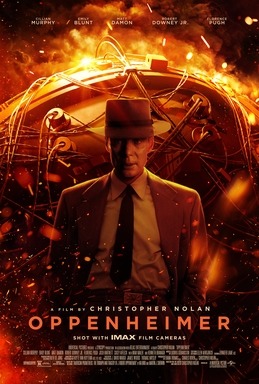
Oppenheimer--This biopic splits time the way its hero splits the atom. Narrative is fissionable to writer-director Christopher Nolan; he skips back and forth between episodes of Oppenheimer (Cillian Murphy) as a bumbling student, then as a philandering rising star in the new field of quantum physics, then as the determined yet haunted lord of Los Alamos, then as a post-bomb martyr to '50s era red-baiting. It glides along smoothly through its fractured scheme, beautifully shot by Hoyt van Hoytema in black and white and varyingly muted shades of color depending on period and point of view, and pushed along by a solemn Philip Glass-esque score by Ludwig Göransson.
Often crowned by a horizontal wide-brimmed preacher-style hat that makes him look like Brad Dourif in Wise Blood, Murphy uncannily captures the bursting, wide-eyed, near-ecstatic face that we see in photos of Oppenheimer. But he manages to give the performance a human dimension, with everyday foibles and touches of humor. He's not a pageant figure.
Murphy carries a star presence. But he's very ably supported by a huge, colorful gallery of star character players: Robert Downey Jr. as AEC Chairmen Lewis Strauss and Josh Hartnett as Ernest Lawrence and Benny Safdie as Edward Teller and Tom Conti as Albert Einstein and David Krumholtz as Isidore Rabi, Oppenheimer's menschy colleague who makes sure he eats and nudges his conscience, and Matthew Modine and Casey Affleck and Kenneth Branagh and Rami Malek and Alden Ehrenreich, to name only a few.
They're all entertaining, but two in particular jolt the movie to life: Florence Pugh as Oppenheimer's joyless lover Jean Tatlock and Matt Damon as the practical-minded, professionally unimpressed Leslie Groves, representing us laypeople in his deadpan, flummoxed scenes with Murphy. For a while it seems like Emily Blunt is underserved as Kitty Oppenheimer, but near the end she gets a juicy, angry scene opposite AEC lawyer Roger Robb (Jason Clarke), who has underestimated her.
Other than maybe a few too many scenes of the young "Oppie" having visions that look like the psychedelic mindtrip at the end of 2001, there was no point where I found Oppenheimer less than absorbing. Few would suggest that this ambitious, superbly acted, superbly crafted film isn't a major, compelling work, a vast expansion on Roland Joffé's watchable but modest Fat Man and Little Boy from 1989. If Nolan's film isn't quite completely satisfying, there could be two reasons.
One is that trying to arrive at a moral conclusion about this movie's hero seems impossible. Put (too) simply: on the one hand, Oppenheimer won World War II for the good guys and checked fascism (not checkmated it, alas) for more than half a century. On the other hand, his invention has the potential to ruin the world for everybody. Both can be true, and the ambiguity is unresolvable.
Another problem with the film, however, is a matter of simple showmanship. Back in 1994, James Cameron brought his silly action picture True Lies to a point where Arnold Schwarzenegger and Jamie Lee Curtis kiss while, far in the distance, we see a mushroom cloud erupt on the horizon. Triumphant, but then Cameron pushed his luck, piling on one last struggle with the villain in a Harrier jet. I remember thinking (and writing) at the time that when your hero and heroine kiss in front of a mushroom cloud, the movie is over.
Oppenheimer, obviously a very different movie, is uneasily structured in the same way. The scenes leading up to the Trinity Test at White Sands in 1945 are riveting, pulse pounding. The explosion and the immediate aftermath, ending the war in Japan, is a stunning dramatic climax.
But then the movie keeps going, for another hour or so, detailing the war of spite and will between Strauss and Oppenheimer, and the revocation of Oppenheimer's security clearance. It's interesting, provocative material in itself, but it seems a little petty and trivial after the "I am become death; destroyer of worlds" stuff. Given Nolan's supposed consummate skill at scrambling sequence, couldn't he have somehow structured the movie to end with a bang and not a whimper?
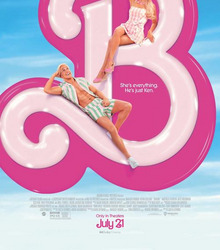
Barbie--Something is rotten in the state of Barbieland. As this, her first live-action feature begins, our titular heroine finds herself haunted, right in the middle of raging dance parties at her Dreamhouse, by thoughts of death. Still more alarming, when she steps out of her pumps, her feet go flat to the ground.
To be clear, the Barbie in question, played by Margot Robbie, is "Stereotypical Barbie," the blond, inhumanly thin and leggy iconic version of the Mattel doll. She shares the relentlessly cheery pink-plastic realm of Barbieland with countless other Barbies of every race and body shape and profession, all happy and accomplished and untroubled and mutually supportive. They're dimly aware of us in the "Real World"; they believe that their own harmony has created an example that has led to female empowerment and civil rights over here.
The Barbies also share Barbieland with Ken (Ryan Gosling) and countless variant Kens, as well as Ken's featureless friend Allan (a perfectly cast Michael Cera). But the guys exist entirely as accessories to the relatively uninterested Barbies. Ken's unrequited fascination with Barbie makes him subject, unlike the Barbies, to dissatisfaction.
Barbie goes for advice to "Weird Barbie" (Kate McKinnon), whose hair is frizzy and patchy and who's stuck in a permanent split. She's told that her troubles come from the dark feelings of somebody who's playing with her in our reality, so she sets out on a quest to the Real World, emerging in Venice Beach. Barbie connects with a mom and teenage daughter (America Ferrera and Ariana Greenblatt) whose relationship is strained; she's also pursued by the all-male board of Mattel, led by Will Ferrell. Ken, meanwhile, learns about our patriarchy, likes what he hears, and heads back to Barbieland alone to institute it, with himself at the top.
Mattel was founded in 1945, the same year as the Trinity Test, and there are probably feminist social critics who would argue that Barbie, invented in 1959 by Mattel co-founder Ruth Handler (well played by Rhea Perlman in the film), has wreaked only a little less havoc on the modern psyche than Oppenheimer's gadget. Even though I'm in exactly the right generational wheelhouse (I was born in 1962), my own childhood experience with Barbie was very limited, and thus so were my nostalgic associations with her.
Even so, this nutty fantasy, directed by Greta Gerwig from a brilliant script she wrote with Noah Baumbach, made me laugh from its inspired first scene to its Wings of Desire finish. Narrated in the droll, arch tones of Helen Mirren, it manages to come across as both an ingenious pop-culture lampoon/celebration and an unpretentious but surprisingly heartfelt deep dive into the implications of the Barbie archetype. I wasn't a big fan of Gerwig's 2019 version of Little Women, but here she builds her world with the freedom of, well, a kid playing with dolls, but also with the confidence and adult perspective of an artist.
Not everything in the movie works; in the second half the narrative gets a little lost at times in some very strange musical numbers/battle scenes, and the whole thing comes close to going on a bit too long. And it's hard to say just who this movie is for. It hardly seems intended for little girls; however smart, they're too young for the commentary about female identity to mean much to them yet. It seems more like it's meant for adult women with both a fondness for and an ambivalence toward Barbie.
No doubt there are those who would also complain that, however witty and self-effacing, the movie amounts to a feature-length commercial for the brand. But in the age of Marvel and other such franchises, it seems a little late to object to this.
The revelation in the film is Margot Robbie. It seems ridiculous that she's able, in the role of freaking Barbie, to give a performance of such subtlety and nuance and shading and quiet, unforced wistfulness, but she does. And she gets to deliver the best last line of the year.
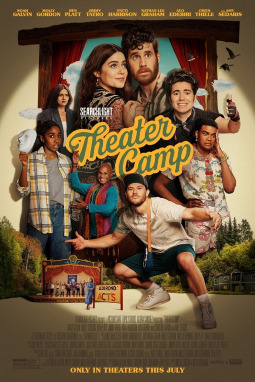
Theater Camp--Joan, the founder of "AndirondACTS," a slightly gone-to-seed theater camp in upstate New York, has fallen into a coma. The job of keeping the struggling camp afloat falls to her decidedly non-theatrical "crypto bro" son Troy. Meanwhile the devoted instructors work with the exuberantly happy campers to mount the shows, including an original musical about the life of poor comatose Joan (Amy Sedaris). Needless to say, all does not go smoothly.
The creators of this Waiting for Guffman-esque "mockumentary" comedy, Molly Gordon, Nick Lieberman, Ben Platt and Noah Galvin, know the world they're depicting well; all of them have been doing theater since they were small children. Gordon and Lieberman co-directed, from a script by all four; Platt and Gordon play Amos and Rebecca-Diane, the utterly enmeshed, co-dependent acting instructors and Galvin plays the low-profile tech director.
They capture the camaraderie and the sense of belonging that theater can give kids, and their affection for that world is unmistakable, but they're careful not to get too sentimental. The envies and resentments and passive-aggressive denigrations among theater folk, especially at this often professionally frustrated level, are vividly represented.
Getting laughs from the self-important vanities of theater people is pretty low-hanging fruit, I suppose, but Theater Camp is nonetheless often hilarious. The film also manages to get a little deeper at times, touching on the irony that while theater can create a haven and a community for misfit kids, this can generate its own clannishness and exclusionary snobbery, as in Amos and Rebecca-Diane's coldness toward the imbecilic but well-intentioned Troy, charmingly played by a sort of poor-man's Channing Tatum named Jimmy Tatro.
The real joy in Theater Camp, of course, is the acting: Platt, Gordon, Tatro, plus a few vets like Sedaris, Caroline Aaron and David Rasche bring the material to life. But as Glenn, the long-suffering backstage drudge who really ought to be onstage, Noah Galvin, who replaced Platt on Broadway in Dear Evan Hansen, is the revelation among the adults in the cast. He's a knockout.
The revelation among the kids playing the campers is, well, pretty much all of the kids playing the campers. There are some real singing, dancing and acting prodigies in this company. If there was a real theater camp somewhere with this kind of talent, their shows would sell out.
#oppenheimer#barbie#theater camp#greta gerwig#christopher nolan#margot robbie#cillian murphy#matt damon#florence pugh#emily blunt#ben platt#molly gordon#noah galvin#robert downey jr#ryan gosling#will ferrell#rami malek#kenneth branagh#tom conti#nick lieberman#jimmy tatro
12 notes
·
View notes
Text
Oppenheimer (2023)
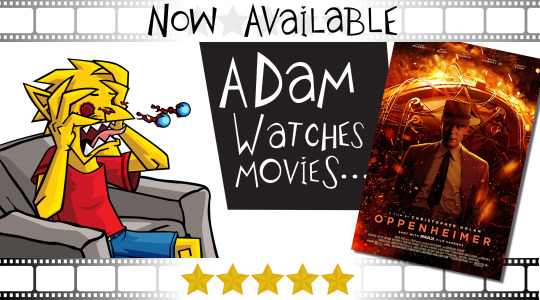
Visually striking, magnificently performed and expertly written, Oppenheimer is the kind of movie that doesn’t really contain any twists but makes you feel like you need to see it more than once. This is a movie that sticks with you.
In 1954, J. Robert Oppenheimer (Cillian Murphy) attends a private hearing before a Personnel Security Board to dispute his clearances. As the man who helmed the Manhattan Project, Oppenheimer feels personally responsible for the use of nuclear weapons. He seeks to limit their use and the development of future, more devastating weapons. As part of the hearing, Oppenheimer’s past is examined. Everything from his time studying experimental physics in Cambridge to his working relationships with famed physicists, his supposed communist ties and his many extra-marital affairs are laid bare.
The first thing to discuss is the picture’s running time. Oppenheimer clocks in at about 3 hours if you include the credits. That’s a lot but only in the sense that you probably shouldn't start watching it at 10:30 pm. In practice, it doesn’t feel long; not at all. In fact, the extended running time is one of the reasons why this film is so successful. There are A LOT of people to keep track of. We meet Albert Einstein, Niel Bohr and other physicists you haven’t heard of. More relevant to Oppenheimer's personal life is his second wife, “Kitty” (Emily Blunt), the woman he has an affair with, Jean Tatlock (Florence Pugh), his brother, Frank (Dylan Arnold), the director of the Manhattan Project, Gn. Leslie Groves (Matt Damon), and the man who recruits him, Lewis Strauss (Robert Downey Jr.). If this movie was cramming everything in 90 minutes, you’d struggle to remember who’s who, what are they doing and why.
Having that extra bit of time to process everything is a blessing. Those extra minutes also allow director Christopher Nolan (who co-wrote the screenplay with Emma Thomas and Charles Roven) to show us what makes Oppenheimer tick. There’s an immensity to the picture. We understand the destruction these weapons are capable of and the responsibility that accompanies them because we saw how big a project it was, how long it took and how worried the people were during their development. The secrecy, the uncertainty, how it consumed the lives of those involved. We understand the magnitude of what Oppenheimer and his team unleashed when no one else seems to.
One of my favorite things about biographical films is that they teach you about people. Specifically, they teach you to love some and hate others. Well, maybe that says more about me than about the movies. During Oppenheimer, you’ll develop a love-hate relationship with many people. On the one hand, Oppenheimer is so mature in his handling of the nuclear equation. In other aspects of his life, he’s so irresponsible he threatens to doom us all. Why can’t he stop cheating on his wife? Why can’t he understand that associating himself with communists puts him and his work at risk, regardless of how little he actually believes in the political system’s merit? The one you’ll develop the strongest feelings for is undoubtedly Lewis Strauss, but he’s in the movie a lot. You might excuse him as a… complicated person.
Pairing the pink-infused Barbie with Oppenheimer, preferably as a "Barbenheimer" double-feature (two 5-star movies in my book) is fun and begs an important question: which do you watch first? I saw both, back to back. The funny thing is that in some ways, they're not as different as they'd seem. Both, for instance, contain surreal fantasy sequences that allow us to peer into the protagonist's mind and ask big questions about where their titular characters belong in our world, how they affect(ed) it and what we, as audiences, can learn from that. The main difference is that Barbie is often funny and uplifting, while Oppenheimer is somber and heavy. That might make you lean towards the doll movie second, as a way to leave the theater feeling good, but honestly, you can't go wrong with the reverse order either. While Oppenheimer can feel overwhelming, teetering towards the depressing, it's also so well made, so powerfully acted and so grandiose of an experience that ultimately, it makes you feel good to have witnessed it. See them both. See them more than once - just don't start your marathon at 10:30 pm. (August 11, 2023)
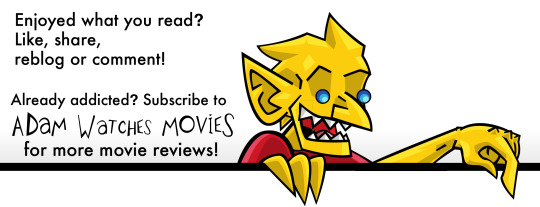
#Oppenheimer#movies#films#movie reviews#film reviews#Christopher Nolan#Emma Thomas#Charles Roven#CIllian Murphy#Emily Blunt#Matt Damon#Robert Downey Jr.#Florence Pugh#Josh Hartnett#Casey Affleck#Rami Malek#Kenneth Branagh#2023 movies#2023 films
5 notes
·
View notes
Text
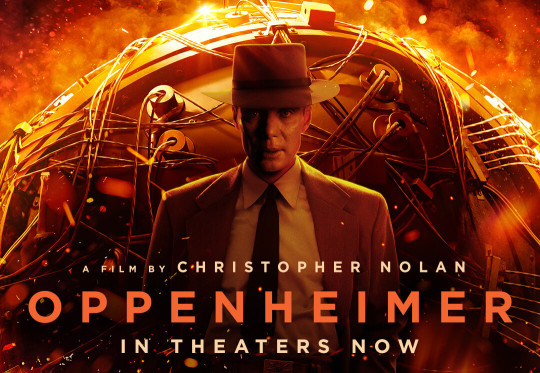
I came into the theaters with the highest expectations, and it somehow met that "expectation" (I know...I really have the nerve to say that against a Christopher Nolan film). Honestly, if I'm not mistaken, Oppenheimer is the most realistic and less explosive film of Nolan. The first part of the film may be a drudge for some as it lays ground on the inception of the conceptualization of the atomic bomb. It's annoyingly scientific and technical, so as a stupid viewer, (haha!) it bored me a bit. Then comes the second part. Now, this part is the most exciting when Robert Downey, Jr.'s character came in against Oppenheimer. It's thrilling, insightful, and Albert Einstein cameo feels so real and historic. I like what Einstein told Oppenheimer about the consequences of achievement; it rings so true. Emily Blunt's annoyed and defensive character is someone you will root for as Oppenheimer takes all the accusations against his loyalty to America and his integrity to his invention. What I appreciate the most about the film is its sound and score. It's like part of the development of the characters and the plot, so they take a significant role in the progression. Again, Christopher Nolan has created a feat, and surely this will bag a lot of awards at the end of the year.
#movie review#oppenheimer#christopher nolan#cillian murphy#emily blunt#robert downey jr#albert einstein#physics#atomic bomb
7 notes
·
View notes
Text

Article in link or read below:
THE BIG PICTURE
Christopher Nolan's Oppenheimer features an impressive ensemble cast, including Josh Hartnett, who delivers a nuanced supporting performance.
Hartnett's character, Ernest Lawrence, plays a significant role in J. Robert Oppenheimer's life and work, offering a unique perspective on his genius.
Lawrence's relationship with Oppenheimer showcases the film's political themes and highlights Hartnett's excellent portrayal of empathy and conviction.
Christopher Nolan has a knack for wrangling impressive ensemble casts for his films, but he really outdid himself with his 3-hour historical epic Oppenheimer. Even if the World War II biopic didn’t include the frequent Nolan collaborator Michael Caine, the stacked ensemble is filled with a terrific ensemble of veteran Hollywood stars, Academy Award-winning performers, underrated character actors, relative unknowns, and a few former box office titans that have seemingly disappeared over the last decade or so. It wasn’t that long ago that Josh Hartnett was the marquee lead of films like Lucky Number Slevin and Black Hawk Down, but his star power has seemingly evaporated, as some actors can only maintain the same level of success for so long. However, Hartnett has always been a more interesting and complicated actor than the roles that he was given at the beginning of his career. Hartnett isn’t just in the middle of a major comeback; he basically steals Oppenheimer with one of the most nuanced supporting performances.
Oppenheimer is told in non-chronological order, in what has become a hallmark of nearly all of Nolan’s films. While Hartnett doesn’t play a significant role in the black-and-white sections that show the confirmation hearings for Lewis Strauss (Robert Downey Jr.), he is instrumental within the main storyline focused on J. Robert Oppenheimer’s (Cillian Murphy) studies at the University of California in Berkeley, where he first conceived of much of the technology that ended up becoming critical within the Manhattan Project. The sequences in Berkeley aren’t just where Oppenheimer unlocks part of his genius, but also where he falls in love with his second wife Kitty (Emily Blunt), and makes a community of friends for the first time. It is during this period that he works hand-in-hand with Hartnett’s depiction of Ernest Lawrence; having an outsider’s perspective on Oppenheimer’s work was necessary for this sequence to function.
Ernest Lawrence was an incredibly influential figure in Oppenheimer’s life. While he’s not someone that Oppenheimer often looks up to and idolizes like Neils Bohr (Kenneth Branagh) or Albert Einstein (Tom Conti), Lawrence represents the sort of man that Oppenheimer could never really become. Hartnett depicts Lawrence as a man of great importance, intelligence, and class that also has a relatively normal social life and shows an ability to adjust to the stresses within his life. Lawrence encourages Oppenheimer to find a balance within his work, but it becomes obvious that it’s not possible for someone with his capacity for genius. It creates an odd tension between them; Lawrence feels both resentful and sympathetic for his friend. Oppenheimer’s inability to simply “turn off” his brain and focus on something other than his work may end up making him more historically important than Lawrence, but it negates any sense of accomplishment or happiness he may feel.
Josh Hartnett does some really outstanding subtle work with his performance, as there’s an interesting dichotomy to Lawrence’s feelings about Oppenheimer. He’s not resentful, as he and Oppenheimer are able to get along and share much in common due to their shared experience in nuclear research. Lawrence is someone who can communicate with Oppenheimer on an intellectual level about the groundbreaking studies that are being done, but he’s not capable of reaching the same next-level conclusions. Lawrence is well-educated and knows what he’s talking about, but also acknowledges that it’s not his name that the world will remember. It was almost a bit of reflective acting on Hartnett’s part as if he was acknowledging that he was no longer the same star who had led Pearl Harbor to its box-office success two decades prior.
Christopher Nolan isn’t necessarily known as a “political filmmaker,” but while his films aren’t necessarily as overt as the work of directors like Oliver Stone or Spike Lee, there are strong anti-war, anti-escalation themes in The Dark Knight, Dunkirk, and Tenet. Oppenheimer is definitely Nolan’s most overtly political work to date, and Lawrence is instrumental in unpacking the film’s complex understanding (and criticism) of the decisions that Oppenheimer made on behalf of his country during his lifetime. At first, Oppenheimer’s relationship with Jean Tatlock (Florence Pugh) is nothing more than a passionate romantic affair, but it's Lawrence who explains the danger that being involved with the socialist political movement at the time that they are in. Lawrence has his personal feelings about the rising Communist movement, but he worries that Oppenheimer’s mind could be distracted when he’s working on studies that could literally change the way that mankind observes the world.
The political differences between Lawrence and Oppenheimer are fascinating, and Hartnett does a great job of showing Lawrence’s conviction in his belief and handling the dense political dialogue. It’s fascinating that Lawrence’s political beliefs aren’t delved into that deeply other than his expressed desire to keep all discussions about the socialist movement out of the classroom. Lawrence tells Oppenheimer that he considered himself a patriot, but he also wants the University to be an institute of science, and not a hangout spot for a potentially dangerous movement to begin. He and Oppenheimer begin to grow further apart as a result of this, but they still share a mutual understanding of which events transcend their own personal beliefs. Both men react with the same surprise and fear when news of Adolf Hitler’s invasion of Poland breaks.
Josh Hartnett does a great job of showing Lawrence’s empathy for Oppenheimer. While he understands that a traditional celebration isn’t necessarily something that Oppenheimer would enjoy, there’s a friendliness between the two men that continues after General Leslie Groves (Matt Damon) whisks him away to work on the Manhattan Project. Lawrence refuses to report incriminating evidence on Oppenheimer during the government’s investigation, and the two are able to shake hands at the end of the film. That’s more than Oppenheimer can say about Edward Teller (Benny Safdie), whose pro-nuclear beliefs created too much of a divide between them.
Josh Hartnett is in the midst of a much-needed comeback, and it’s great to see that Oppenheimer gave him such a nuanced role to execute. While it may have taken a while for him to finally get the chance to work with Nolan, his performance is one that is essential to show what made Oppenheimer tick on both an intellectual and personal level.
6 notes
·
View notes
Text
CHARACTER STATS FRAMEWORK.

NAME: Ava Troy
OTHER NAMES: Circe (Unknown to her)
TITLE: Mother, Sorceress and Goddess (unknown to her)
AGE: 44 (false memories) true age unknown
BIRTHDATE: September 23, (false- true date unknown)
SPECIES: Human (false) Goddess
NATIONALITY: American, Greek ancestry (false)
GENDER: Female
PREFERRED PRONOUN(S): She/Her
ROMANTIC ORIENTATION: biromantic- strong tendency to men
SEXUAL ORIENTATION: Bi
RELIGION: none
OCCUPATION: Attorney (false)
FACE CLAIM: Eva Green
PARENTS: Marina and Albert Troy (false) Perseis and Hyperion
SIBLINGS: None close to her,
SIGNIFICANT OTHER(S): None,
CHILDREN: Donna Troy (false- truly her kidnapping victim) 3 dead sons
CLOSEST FRIENDS: No one she'd truly call a friend- more acquaintances, Kathryn Nolan, Archie Hopper, her coworkers at the law firm,
ENEMIES: None known to her, (Hippolyta, and Diana of Themyscira)
EYE COLOR(S): Blue
HAIR COLOR(S): black.
HEIGHT: 6’1″
0 notes
Text
'The real-life J. Robert Oppenheimer died after the events that took place in Christopher Nolan's latest film Oppenheimer. In an unusual move for a biopic, Nolan decided not to include an overview of Oppenheimer's final years before his death presumably because the character symbolically already had 'become death' in the film. The thought-provoking portrait of the controversial physicist depicted many aspects of his personal life as it related to his creation of the atomic bomb, highlighting the tragic reality that even the most genuine pursuits can have the most devastating consequences.
Oppenheimer's ending explained the incredible guilt that the historical figure felt in the aftershock of one of the world's most brilliant yet terrifying creations. While the real-life J. Robert Oppenheimer was flawed in many ways, his remorse for his own innovation demonstrated an empathetic thoughtfulness at the core of his revolutionary mind. Lost and blinded by his ambition to break new ground in a triumphant nationalistic effort, Oppenheimer's self-reflexivity only acted against him in the end once the literal damage has been done. As his wife Kitty (Emily Blunt) reminds him in the film, Oppenheimer couldn't "commit to sin" and then expect people to pity him afterward.
J. Robert Oppenheimer Died In 1967 After Battling Throat Cancer
J. Robert Oppenheimer died in 1967 from throat cancer. The known chain smoker had been diagnosed with throat cancer in 1965. Oppenheimer underwent surgery in an attempt to remove the cancerous cells from the throat but the procedure was ultimately unsuccessful. He also tried chemotherapy and radiation treatment which failed to provide positive results either. Oppenheimer fell into a coma on February 18, 1967 and died three days later on February 21 at the age of 62 at his home in Princeton, New Jersey.
Despite perceptions and rumors that Oppenheimer developed cancer due to the radiation from his atomic testing, it is much more likely that his throat cancer was the result of his relentless smoking habit. Hundreds of people living in New Mexico near Los Alamos have come forward throughout the years since about eventual radiogenic cancers they have developed, claiming a link to the Trinity fallout zone. Oppenheimer leaves out the fact that two scientists at Los Alamos actually died from radiation poisoning. As for Oppenheimer himself, his death is regarded as having little-to-nothing to do with radiation exposure or poisoning.
Oppenheimer's Death Occurred Four Years After The Movie's Latest Scene Oppenheimer's death occurred four years after his medal ceremony, which took place in 1963. This explains his older and more fragile look in the latest depiction of the character in Nolan's Oppenheimer. The final scene of Oppenheimer, which features the protagonist with Albert Einstein, occurred roughly 20 years before his death. After he had lost his security clearance as a result of the 1954 security hearing, Oppenheimer was essentially stripped of all political power but continued his lectures and writings on his expertise and experience in physics. He advocated against the advancement of science as a means of political advantage in his later years and died as an honorary hero who was largely disavowed by his own country following the events of Oppenheimer.'
11 notes
·
View notes
Text
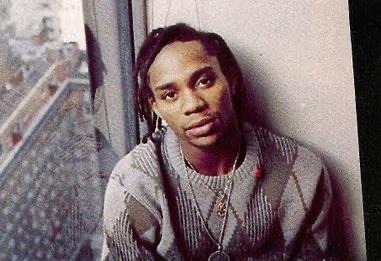
Gene Anthony Ray (May 24, 1962 – November 14, 2003) was an actor, dancer, and choreographer. He was known for his portrayal of dancer Leroy Johnson in both Fame and the Fame television series.
Born in Harlem, he became involved in street dancing at block parties. He performed in a dance class at the Julia Richman High School. He skipped school one day to audition for Fame. He attended the High School of Performing Arts, the inspiration for the film Fame.
Much like his Fame character, he had little professional training, but he possessed a raw talent that won him his role in the film.
He starred as Friday in Vendredi ou la Vie sauvage (alternative title: Robinson Crusoe and Man Friday).
He danced in The Weather Girls’ music video for “Well-A-Wiggy”. He began touring the UK with the other members of the Fame cast as The Kids from “Fame”; they performed at 10 venues, including a sell-out performance at Royal Albert Hall.
He won the role of Billy Nolan in the musical version of Carrie. He played the role in the original opening in Stratford-Upon-Avon. He then transferred to Broadway and continued to play the role until the musical closed.
He appeared in Out-of-Sync, Eddie, as well as in commercials for Dr. Pepper and Diet Coke.
His last video project was a one-hour Fame reunion documentary, Fame Remember My Name. #africanhistory365 #africanexcellence
0 notes